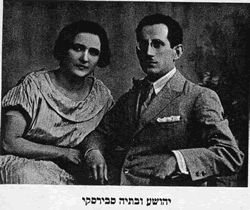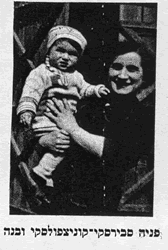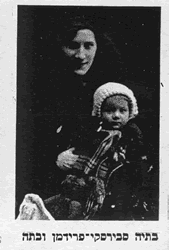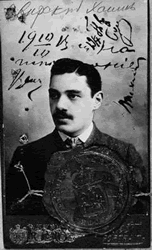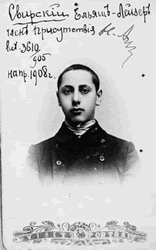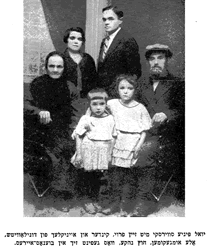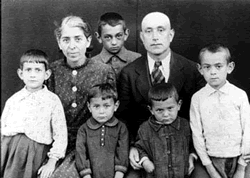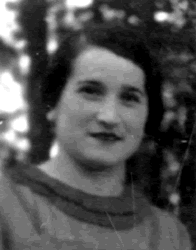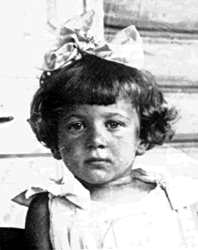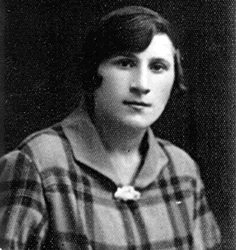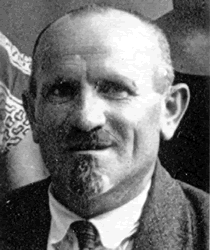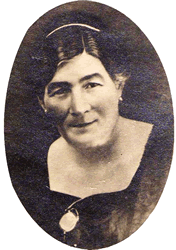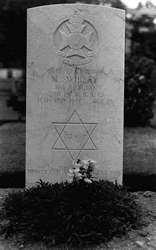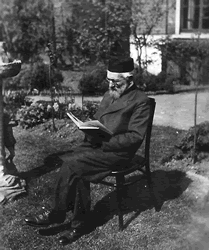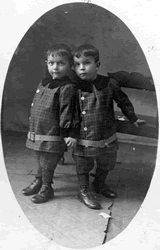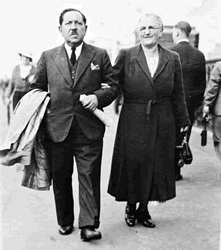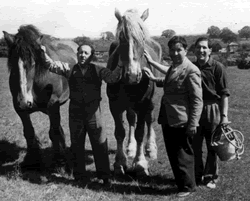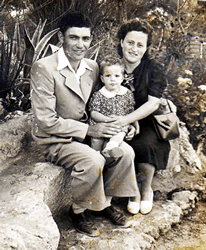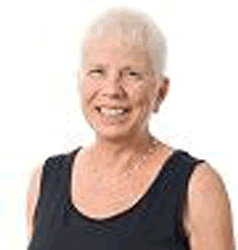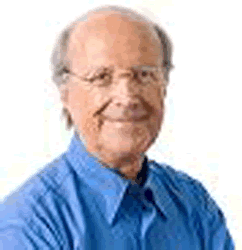#sws-6
Yoel Pinie Swirski with familoy in Danilovich. All perished but son
Noach in Argentina.
#sws-7
#sws-8
Fania Konetzpolski nee Svirski was born in Wylejka, Poland in 1911 to Moshe and Miriam. She was a housewife and married to Mordekhai. Prior to WWII she lived in Wylejka, Poland. During the war she was in Wylejka, Poland. Fania was murdered/perished in 1942 in Wylejka, Poland at the age of 31. This information is based on a Page of Testimony (displayed on left) submitted by her niece
#sws-9
Ester Fridman was born in Wilejka, Poland in 1932 to Betzalel and Berta nee Svirski. She was a child. During the war she was in Wilejka, Poland. Ester was murdered/perished in 1942 in Wilejka, Poland at the age of 10. This information is based on a Page of Testimony (displayed on left) submitted by her cousin.
#sws-10
Berta Fridman nee Svirski was born in Wilejka, Poland in 1913 to Moshe
and Miriam nee Rudenski. She was married to Betzalel. Prior to WWII
she lived in Wilejka, Poland. During the war she was in Wilejka,
Poland. Berta was murdered/perished in 1942 in Wilejka, Poland at the
age of 29. This information is based on a Page of Testimony (displayed
on left) submitted by her niece.
#sws-11
Moshe Svirski was born in Svir, Poland in 1875 to Simkha and Shosha
nee Levin. He was a lumber and woods merchant and married to Miriam
nee Rudenski. Prior to WWII he lived in Wileiko, Poland. During the
war he was in Wileiko, Poland. Moshe was murdered/perished in 1942 in
Wileiko, Poland at the age of 67. This information is based on a Page
of Testimony (displayed on left) submitted by his granddaughter Ruth.
#sws-12
Miriam Svirski nee Rudenski was born in Wilno, Poland in 1878 to
Yerakhmiel. She was a housewife and married to Moshe. Prior to WWII
she lived in Wilejka, Poland. During the war she was in Wilejka,
Poland. Miriam was murdered/perished in 1942 in Wilejka, Poland at the
age of 64. This information is based on a Page of Testimony (displayed
on left) submitted by her granddaughter Ruth Ben Yami.
#sws-13
Max Swirsky died of wounds in the Greek campaign, 1941, and is buried in the British Military Cemetery in Athens (photo of gravestone submitted by his nephew Yehoshoa Sivan.
-- 2. Abraham Swirsky
#sws-14
Max Swirsky died of wounds in the Greek campaign, 1941, and is buried in the British Military Cemetery in Athens (photo of gravestone submitted by his nephew Yehoshoa Sivan.
-- 2. Abraham Swirsky
#sws-15
My father Isaac Swirsky (anglicized to Oscar) was George's twin. Photo taken either in Vidz or in Kirsanov (Russia) before they left for England in 1913, when they were 2.5 years old.
(Submitted by Yehoshua Sivan)
#sws-16
My grandfather, Abraham Swirsky with my grandmother, Yudis (Yehudit), a the daughter of Ber Sholem Dov Okun and Haya Sragowitz . ( submitted by Yehoshua Sivan)
#sws-17
#sws-18:
Zvi and Sonia Swirski with daughter
#sws-19
#sws-20
#sws-21
#sws-22
Posted: 3 Jan 2003 7:08PM GMT
Classification: Query
Surnames: Swyer, Swirski
My great grandparents on my mother's side were born outside Vilnius in
present day Lithuania. Their original names were Mowscha Swirski and
Zipa Byalou– changed to Morris Swyer and Celia White respectively when
they immigrated in 1913 and 1908. Morris's parents were Peretz Swirski
and Bailya Koganovich. Celia's were Shaina Pesha Alperovitsh (changed
to Sadie Alpert upon immigration) and Aryeh Leib Byalou. Both had
connections to the towns of Swir, Vileyka, and Vilna. Morris and Celia
were married in 1915 and settled in upstate New York. If anybody's
genealogy matches, or closely resembles what I have mentioned, I would
be happy to hear from you!
Hi......My mother's great grandparents on her mother's side seem to
match this. My grandmother was Fannie Swirski Rogosin.
My grandmother's parents were Peretz Swirski and Bailya Koganovich. I
was named for Bailya. My mom, Sylvia Rogosin has a hebrew name of Reva
Zilpa...which sounds like she was named for Zipa Byalou. Morris's
oldest daughter is Syd who lives in Albany. Syd's brother is Louis.
Feel free to email me.
Barbara P (fit4eva@gmail.com)
--
Eilat Gordin Levitan
Now, residents of the Vilna ghetto received an announcement that
anyone wishing to join the OsmienyJews being taken to Kovno were
permitted to do so. Since we had heard rumors that life in the Kovno
ghetto was slightly better and the Jews there received slightly larger
apartments, anyone with relatives in Kovno immediately registered to
join the people who were going there. They felt secure in doing this,
as they were told that the Jewish commandant of the ghetto - Gens - as
well as the police and doctor were going to take them there
personally. In addition, some people who had moved from Kovno to Vilna
now decided to return to their families.
Joshua Svirski had registered in Osmieny to go to Kovno. When his son
Siama found out that his parents were going to Kovno, he decided to
join the people going there so he could see them for the first time in
many months. I remember my last meeting with Siama. Amongst all the
other things we talked about, he said, "Despite the fact that I am
with my people here in the Vilna ghetto, and I even made contact with
the resistance movement here, I prefer to join my parents in Kovno."
I have no doubt that the parents had very convincing arguments for why
they decided to go to Kovno, but I said to him, "in spite of what you
are saying it seems that you are ambivalent, and are joining the group
going to Kovno hesitantly."
He answered, "you are right. I have not yet made up my mind. I will
make a final decision when I meet my parents in the train station of
Vilna."
He left to go to the train station and never returned.
The Martyr Siama Svirski
Amongst all the bodies one was still alive. He must have been in
shock, but when Weiss kicked his foot he opened his eyes. Weiss yelled
at him, "get up, you bloody Jew!" and kept kicking him. This living
corpse was none else than Siama Svirski, the son of Joshua and Batja
from Vileyka. His clothing was completely torn and saturated with
blood. He may have been wounded, but his face was still beautiful,
particularly in contrast to his surroundings - blood and mud. It made
his face shine and sparkle with amazing luster.
The policeman later said, "I was amazed by his beauty and very
surprised that I had never noticed this striking face while in the
ghetto. Weiss was also very impressed by this handsome countenance,
and said to him, 'handsome young Jew, are you born of a woman?'
"Siama answered him, 'I am only a man, a young Jewish man who wishes
very much to survive. So far, the bullets of death have not killed me.
Perhaps it is a sign that I am not yet fated to die. For that, you
should allow me to live.'
"The answer of Weiss came swiftly. 'Your privilege, then, is that you
will be shot to death at the hands of a German officer.'
"Siama answered serenely, 'Jewish blood spilled at the hand of a
German officer demands vengeance.' A shot pierced the heart of Siama,
the martyr son of our town - a shot from the filthy hand of the most
awful murderer the earth has ever carried.
"In conclusion," the policeman said, while holding his face in his
hands, "this young man does not let me rest. Everywhere I go, I see
him alive before my eyes, whether I am awake or asleep. His radiant
dying face comes to haunt me in dreams and nightmares.
was the employ of a wealthy Pole named Bushevsky, who owned land in
Lyntupy
....Minna's parents Fanya (Feige) Swirsky of Lyntupy and Max Friedland
were married in 1917. Minna was born in Yekatarinaslav or
Dniepropietrosk (Russia names and renames cities to suit its politics)
where her father was a successful textile merchant. However times were
turbulent, Red Russians fighting Whites. Father had already had his
experience with the Revolution when he and a group of others were
taken from a train, made to undress and hand over their belongings.
Then they were lined up in a field and the soldiers began their
executions when suddenly they were overwhelmed by opponents. Max fled,
naked, to a peasant cottage. The owners fed and clothed him and
allowed him to escape. With this background and the fact that he was
considered a "bourgeois", flight was the obvious decision. The couple,
smuggling Minna in a pillow case, ran away to Vilna where Fanya had
family, and where soon afterwards her brother Boris was born. There is
evidence that a settlement existed there as far back as 1128. In 1323
it became the capital of Lithuania. In the Middle Ages Lithuania and
Poland united. After many occupations by Russia, France, Germany and
again Russia, it became the capital of independent Lithuania. For 150
years, in the 19th and 20th centuries, its Jewish community was the
center of Eastern European cultural life and a focus of the Zionist
movement. In 1941 there was a Jewish population of 80,000. In 1945 all
but 6,000 remained after the murderous policies of Nazi Germany.
Minna's grandfather Yoyne Swirsky was a forester in the employ of a
wealthy Pole named Bushevsky who lived most of the time in Berlin. It
was his job to buy and sell orchards, look after machinery that
Bushevsky bought as a hobby and which was stored in warehouses on the
large country estate which he had to supervise as well. Grandfather
owned a small hotel which his daughters helped to manage. Bracha, the
oldest, eventually married and moved to the U.S.A.; Rachel, who
suffered from a slight palsy and never married; Leah, whose husband
was dubbed "The Playboy" for his penchant for cards rather than hard
work, their two children Chaim and Sheinele. Now the fourth daughter,
Fanya Friedland, also lent a hand while her husband, unsuccessfully,
tried to establish himself in Vilna. Grandfather was an Orthodox Jew,
well-respected in the community. He was always formally dressed in a
suit and tie, and wore a hard hat when he went out. He looked
formidable to Minna and she adored him. To her, he appeared very tall,
although, in truth, he was of average height. The highlights of her
stay in Vilna were the occasions when he allowed her to go along on
buying or selling trips to the orchards and the visit to Bushevsky's
Lyntupy estate next to a shtetl by the same name.
Her mother and aunts were brought up on this estate with its miles and
miles of forests, a lake and a white palace, partially destroyed by
fire and abandoned. There were acres and acres of gardens and a large
modern house, the replacement of the palace, which was run by a
housekeeper and many servants. There were stables for the horses and
small cottages which housed the farm workers and in two of which they
lived in the summer--grandfather in one, Fanya, Minna, Boris and
little Chaim in the other.....
For the entire story go to
http://migs.concordia.ca/memoirs/aspler/aspler_1.html--
https://www.youtube.com/watch?v=e6xi3Vbpu_g#t=35
- Eliahu Swirski born in Vilna in 1921– passed away in 2002 . Professor Eliahu Swirski, a gifted entomologist and a veteran among the Israeli entomological community, a world-renowned http://link.springer.com/article/10.1007%2FBF03040001#page-1
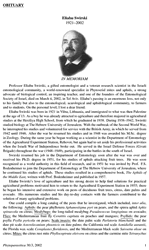
Dear Eilat Gordan Levitan:
I just came back from a visit to the Shtetl where my grandparents Henoch an Shulamith Swirsky (Z”L, born 1894) came from. The Jewish cemetery there was restored, and there was a plaque there saying the restoration was done by an Abraham Yochelman (???????) in 1999. I see on your site that you mention a Yochelman family from Connecticut that has done some memorial restorations in this area. Do you know more about this person? I’d like to thank him!
I found some Swirsky markers in the restored cemetary, for Shimon ben Yehuda Lev Swirsky (d. 1935).
I’ll send you my Adutiskis photos if you’re interested. It was a fascinating visit. The town looks like it hasn’t change much, except that it’s missing its Jews. There are still log-cabin houses that are occupied there.
Happy Shavuot!
--
Robert Swirsky
Yehiel Jochelman ?
Gender:
Male
Birth:
1841
Immediate Family:
Son of itzik Jochelman
Husband of esther Jochelman
Father of Shimon Yochelman; Nechama Jochelman; Ber - Issak Jochelman; Nechama (Yochelman) Gabay and Menachem Mendel
Added by:
Menachem Sella on September 29, 2009
Managed by:
Menachem Sella
Haim
Yochelman
Gender:
Male
Birth:
estimated between 1847 and 1967
Adutiškis, Šven?ionys District Municipality, Vilnius County, Lithuania
Death:
Shoa
Immediate Family:
Son of Moshe Yochelman and Sara-Lea Yochelman
Brother of Yehudit Yochelman and Hana (Henya) Yochelman
Added April 23, 2015
